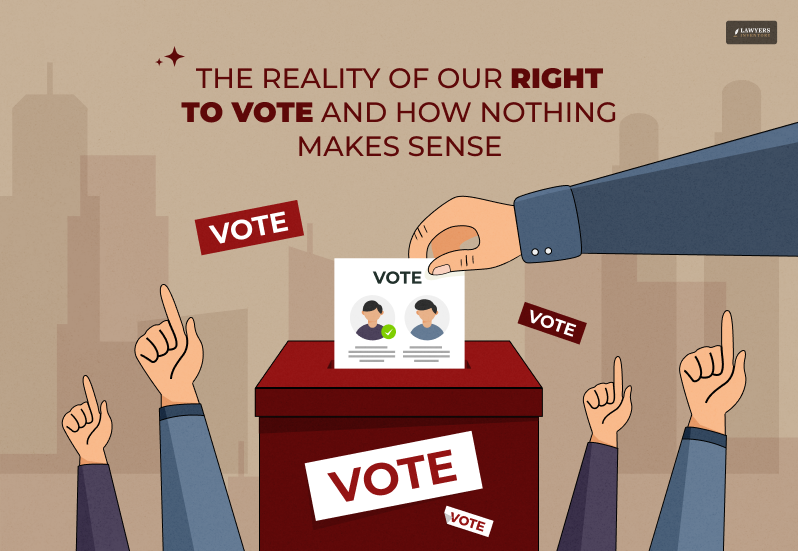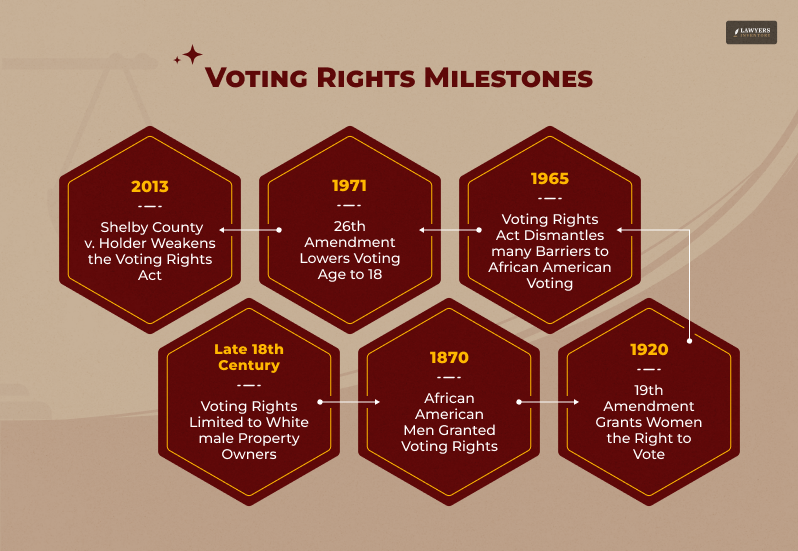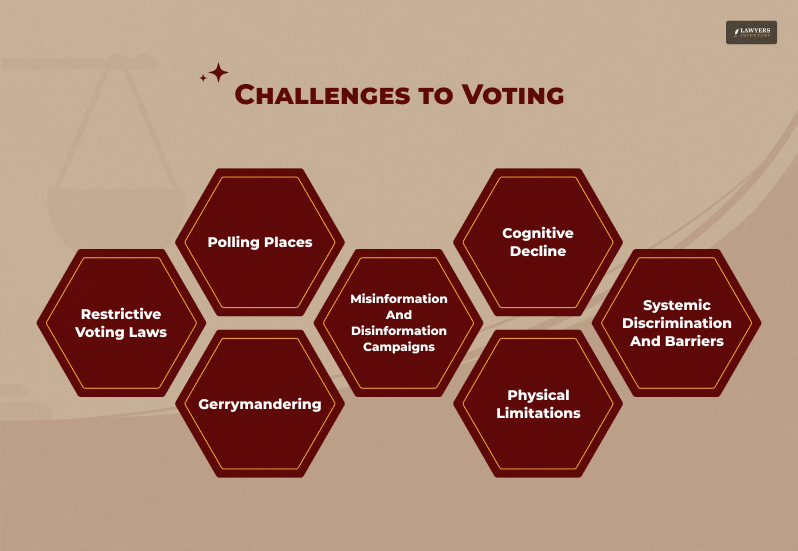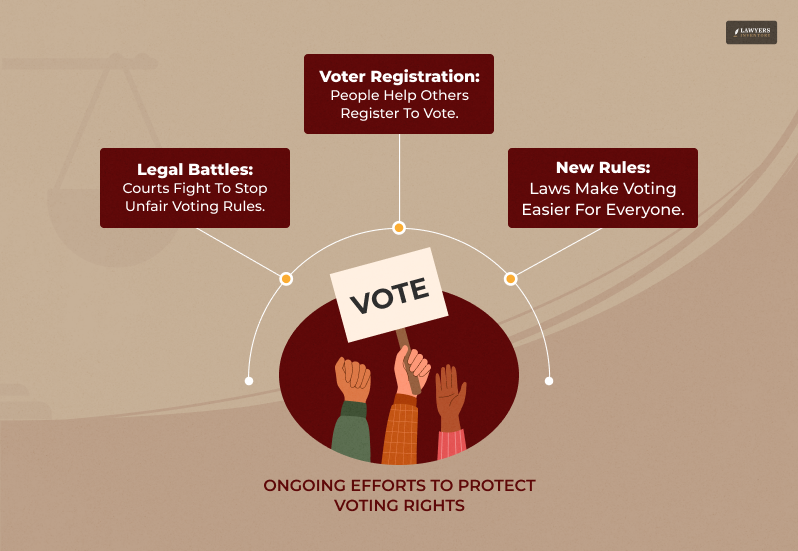
Imagine people telling you your voice doesn’t matter in a democracy that promises equality. This is the harsh reality for millions who face barriers to their right to vote!
Despite being a fundamental right, systemic obstacles undermining the very essence of democracy mar the reality of voting rights.
In this blog, I will delve into the historical significance of voting rights, the challenges marginalized communities face, and the urgent need for reforms. I will also explore how voter suppression tactics, such as stringent ID laws and gerrymandering, disenfranchise many.
I will also discuss misinformation’s role and socio-economic factors’ impact on voter turnout. We aim to advocate for a more inclusive and fair electoral process by highlighting these issues.
Right to Vote and Its Historical Context

A fundamental component of democracy, the right to vote, has undergone substantial change. Voting rights were once limited to a small group of people. For example, only adult male citizens could vote in ancient Greece.
The founding fathers of the United States restricted voting to white male landowners in the 18th century. Up to the 15th Amendment (1870), which gave African American men the right to vote, this discriminatory practice continued throughout the 19th century.
However, because of widespread voter suppression, this was more theoretical than actual. Another significant event was the 1920 ratification of the 19th Amendment, which gave women the right to vote.
A landmark law that removed numerous obstacles preventing African Americans from exercising their right to vote was the Voting Rights Act of 1965.
The idea that people old enough to fight in conflicts should have a role in their government led to the 26th Amendment’s 1971 reduction of the voting age from 21 to 18. The problem of disenfranchisement has persisted despite these developments.
Southern states implemented Jim Crow laws after Reconstruction to deny African Americans the right to vote through literacy tests, poll taxes, and outright intimidation.
the Supreme Court’s 2013 ruling in Shelby County v. Holder disproportionately impacted the minority voters. It undermined the Voting Rights Act and resulted in stricter voter ID requirements and fewer polling stations.
Another important problem is felony disenfranchisement. People with felony records are still denied the ability to vote in several states. In turn, this disproportionately affects African Americans. This technique stifled the Black vote in the years following the Civil War.
Ultimately, while the right to vote has expanded significantly, the battle against disenfranchisement continues. Ensuring universal suffrage requires constant vigilance and advocacy to protect this fundamental democratic right.
Importance of Voting Rights: The Question of Democracy
The foundation of a democratic society is the freedom to vote. They give people a voice in the laws that affect their daily lives.
Voting empowers people by allowing them to have a say in the choices that affect their states, communities, and countries. Voting rights in practice, however, frequently fall short of the ideal.
Voter suppression strategies particularly mars the marginalized groups. For instance, these strategies include gerrymandering, stringent voter ID requirements, and a shortage of polling locations. These voting restrictions compromise election integrity and the “one person, one vote” tenet.
Democracy
The foundation of democratic governance is voting. By designating representatives to make choices, it is the process by which citizens exercise their sovereignty.
Democracy is nothing more than a pretense if people do not have voting rights. Because voting guarantees that the government represents the people’s will, it is indeed “of the people, by the people, for the people.”
Voting allows citizens to take part in the democratic process, which strengthens the political system’s stability and credibility.
Accountability
One effective way to hold elected leaders responsible is to vote. Based on their performance, voters can use it to reward or punish politicians.
Voters have the power to remove an elected official from office in the following election if they do not live up to the expectations of their constituents.
Additionally, this accountability system guarantees that legislators continue to be receptive to the interests and worries of the public they represent.
Moreover, because elected officials know their accountability to the people, it promotes honesty and transparency in governance.
Social Change
Voting is a catalyst for social and political transformation and selecting leaders. Disenfranchised communities have fought for their rights and implemented important reforms throughout history using voting power.
For instance, the American Civil Rights Movement used voting to end segregation and advance equality.
Voting can also influence policy changes on important topics like healthcare, education, and climate change. Voters can fight for a more just and equal society and change the course of their nation by casting ballots.
Voters and Their Struggle: How Have Groups Protected Themselves in U.S. History?
The right to vote is something we often take for granted today, but it hasn’t always been available to everyone. Throughout history, many groups in the U.S. have had to fight long and hard for their chance to have a say in democracy.
Let’s look at how some of these battles unfolded and the incredible perseverance it took to get where we are now.
1. Women’s Suffrage
There was a time when women weren’t allowed to vote—plain and simple. But they didn’t take it lying down. Leaders like Susan B. Anthony and Elizabeth Cady Stanton rallied, marched, and pushed lawmakers to take them seriously.
They faced ridicule and resistance at every turn, but their persistence paid off. 1920, the 19th Amendment was passed, giving women the right to vote.
Of course, this victory didn’t immediately fix everything—women of color, in particular, still faced obstacles. But it was a major step forward.
2. African American Voting Rights
Even after the 15th Amendment which the government passed in 1870, technically giving African Americans the right to vote, many were blocked by unfair tactics like literacy tests, poll taxes, and outright threats.
It wasn’t until the civil rights movement of the 1960s that real change began. With leaders like Martin Luther King Jr. leading the charge, the Voting Rights Act 1965 became law.
This was a game-changer, finally outlawing those discriminatory practices and ensuring African Americans could vote without fear.
3. Native American Voting Rights
Native Americans didn’t even get U.S. citizenship—and the right to vote—until 1924 with the Indian Citizenship Act. Even then, states found sneaky ways to stop them, using excuses like residency rules.
Over time, advocacy groups fought back and won key victories, though challenges like inaccessible polling places on reservations still exist today.
4. Youth Vote
During the Vietnam War, young people had one simple question: “If we’re old enough to be drafted, why can’t we vote?” This argument made waves, leading to the 26th Amendment in 1971, which lowered the voting age to 18.
Today, young voters are a powerful force, often driving conversations about the future.
These struggles remind us how hard people have fought for the right to vote. It wasn’t handed to them—they organized, protested, and demanded change.
Their efforts shaped the democracy we know today and showed that the power of voting is always worth fighting for.
Challenges to Voting Rights

Voting rights, a fundamental pillar of democracy, are under constant assault in many parts of the world. Voter suppression tactics, often employed strategically to marginalize specific groups, have become a pervasive threat to the integrity of elections.
Voter Suppression
One of the most common methods of voter suppression is the enactment of restrictive voting laws. These laws can include voter ID requirements, which disproportionately affect minorities and low-income individuals who may lack access to necessary documentation.
Additionally, reducing the number of polling places, especially in predominantly minority areas, can create long lines and discourage voters from casting their ballots.
Gerrymandering, manipulating electoral district boundaries to favor a particular political party, is another insidious tactic to suppress votes. By gerrymandering, politicians can create districts with lopsided partisan demographics, effectively neutralizing the votes of opposition party supporters.
Additionally, misinformation and disinformation campaigns are also employed to undermine the electoral process. False or misleading information can sow doubt about the legitimacy of elections, discourage voter turnout, and erode public trust in democratic institutions.
Barriers to Voting
Minorities, the elderly, and people with disabilities face unique obstacles when it comes to voting. People with disabilities may require accessible polling places and accommodations to ensure their participation.
Elderly persons may experience challenges related to mobility, cognitive decline, or physical limitations. Minorities, particularly those from underprivileged communities, may face institutional discrimination and barriers that hinder their ability to exercise their right to vote.
The government must address these issues to ensure that all eligible voters have equal access to the voting booth and maintain the integrity of elections. Additionally, people must support the legislation that promotes voting rights.
Efforts to Protect Voting Rights

While there has been significant progress in protecting voting rights, much work remains.
Ongoing efforts to combat voter suppression, increase voter registration, and expand voting access are essential to ensure that every eligible citizen can exercise their fundamental right to vote.
Legal Battles
First, courts have played a crucial role in defending the right to vote. Hertz v. Rent-A-Car and Shelby County v. Holder are landmark lawsuits that have increased voting rights and contested restrictive voting restrictions.
They have contested gerrymandering, restrictive voting rules, and other forms of discrimination.
For example, some voter ID restrictions that unfairly burden minority voters have been overturned by the Supreme Court.
These court cases have been essential in preserving election integrity and guaranteeing that all qualified voters can exercise their right to vote.
Voter Registration Drives
Second, decades have been of initiatives to boost voter turnout and registration.
Political parties, community leaders, and grassroots organizations have organized voter registration drives. In this way, they inform the public about the value of voting and help people register to vote.
By bridging the gap between eligible voters and the electoral process, these initiatives have made it possible for more people to take part in determining the direction of their communities.
Policy Changes
One of the main priorities of recent years has been the laws that the government has proposed and passed to increase voting access.
In several states, there has been a surge in efforts to increase early voting times, introduce automatic voter registration, and offer more secure voting options.
By lowering obstacles to participation and bolstering democracy, these policy measures could make voting easier and more accessible for all individuals.
International Perspective on the Right to Vote
When we talk about voting rights, it’s easy to focus on our own country. But looking at how voting works globally paints a broader picture of the challenges and triumphs of democracy.
Around the world, the right to vote isn’t as universal as it may seem. In some countries, voting is a fundamental part of the system, while in others, it’s restricted or manipulated to maintain power.
In developing countries, the struggle to exercise voting rights is often tied to political instability, corruption, or inadequate infrastructure.
Take Afghanistan, for instance. Decades of conflict have made it difficult for citizens to vote safely and freely.
Similarly, in parts of sub-Saharan Africa, logistical challenges like poor transportation and a lack of polling stations make voting a privilege, not a right.
On the other hand, authoritarian regimes actively suppress voting to maintain control. Countries like North Korea and Belarus are notorious for sham elections where the outcomes are predetermined, stripping citizens of any real choice.
But there are positive examples, too. Scandinavian countries like Sweden and Denmark have made voting accessible and a civic celebration.
Citizens are encouraged to participate, and voter turnout often exceeds 80%. New Zealand sets another great example by extending voting rights to all citizens aged 18 and above and actively working to engage marginalized communities.
The contrast highlights a critical issue: unequal access to the ballot box worldwide. While some nations champion inclusivity, others face significant hurdles.
By examining these differences, we can better appreciate our systems and advocate for fairer practices globally.
After all, the right to vote is more than casting a ballot; it’s about empowering people to shape their future, a fundamental right everyone deserves.
Impact of Technology on the Right to Vote: Something You Didn’t Think About!
Technology is reshaping every aspect of our lives, and voting is no exception. But as promising as digital tools may seem, they come with significant challenges that we cannot ignore.
Online Voting: Convenient but Risky
Imagine casting a ballot without ever leaving your house using a computer or phone. Voting online can help make elections more accessible, particularly for those living in remote places, abroad, or with disabilities.
Estonia is a leader in this area, implementing online voting since 2005. It has demonstrated that voting can be done securely and technologically. However, there are significant hazards associated with this ease.
Most concerning are the cybersecurity concerns. Election results might be questioned if hackers could tamper with votes or interfere with systems.
And then there’s the accessibility issue. Online voting may benefit some people, but it may also exclude others who are neither tech-savvy nor have dependable internet access, thus increasing the digital divide.
AI and Voter Disinformation: A Double-Edged Sword?
Artificial intelligence is a powerful tool, but in the context of elections, it has a dark side. AI algorithms are increasingly used to spread fake news and disinformation, confusing voters about candidates, policies, or voting.
In the 2020 U.S. presidential election, social media platforms faced backlash for allowing misleading ads that AI amplified to millions.
Governments and tech companies are working on solutions like fact-checking systems and AI detection tools to counteract this.
However, the challenge is immense. Educating voters to recognize misinformation is equally crucial to strengthening democracy.
While technology offers exciting possibilities, its misuse can undermine trust in the electoral process.
The key is to strike a balance: embracing innovation while safeguarding against risks to ensure fair and transparent elections.
Which Lawyers Can Help If Your Voting Rights Are Harmed?
Knowing you have legal options is important if you feel your voting rights have been violated. Voting is a fundamental right in a democracy, and professionals specializing in this area must address any harm to this right.
Here’s a guide to the types of lawyers you should consider:
Civil Rights Lawyers
Civil rights attorneys are frequently the first choice in situations involving voting rights abuses. Defending constitutional rights, such as the right to vote, is the area of expertise for these lawyers.
Voter suppression exists in many forms, for instance, being turned away at the polls, discriminatory practices, or problems with voter ID laws. In case you have faced anything of this sort, these lawyers can greatly help you!
Civil rights attorneys can help you file complaints or lawsuits because they are knowledgeable about state and federal legislation, such as the Voting Rights Act of 1965.
Election Law Attorney
Election law lawyers concentrate on election procedures and regulations. These attorneys are qualified to assist if your case includes issues such as ballot access, election mishandling, or disagreements about voting equipment. They work on matters that defend your right to vote by ensuring that elections are transparent and fair.
Nonprofit Legal Aid Organizations
Nonprofit groups like the Lawyers’ Committee for Civil Rights Under Law or the American Civil Liberties Union (ACLU) can offer free or inexpensive legal aid if hiring a private attorney seems daunting or costly. These organizations know how to handle systemic problems and focus on voting rights disputes.
Legal Resources in the Area
You can occasionally find local lawyers who handle voting rights disputes through your local bar organization or legal aid office. When discussing state-specific legislation, these resources are especially helpful.
The Future of Voting Rights: Fundamental Right or Just a Sham?
As our society continues to evolve, so will the challenges and opportunities related to voting rights.
Emerging trends, such as the increasing use of technology in elections and the potential for foreign interference, pose new threats to the integrity of the electoral process.
It is imperative to stay vigilant and adapt to these evolving challenges to protect voting rights.
Despite the obstacles, there is hope for the future of voting rights. The growing awareness of voter suppression tactics and the increasing number of individuals advocating for voting rights reform are encouraging signs.
By staying informed and engaged, citizens can play a vital role in shaping the future of democracy.
All citizens need to participate in civic engagement and advocate for voting rights. This can involve volunteering for voter registration drives, contacting elected officials to express support for voting rights legislation, and staying informed about current events.
By taking action, we can help to ensure that the right to vote remains a cornerstone of our democracy.
The future of voting rights is in our hands. By working together and advocating for change, we can create a more inclusive and equitable society where every eligible citizen has the opportunity to exercise their fundamental right to vote.
No one should feel powerless when their voting rights are harmed. Seeking the right legal help ensures your voice is heard and protects the integrity of democracy.
What are your thoughts on the current state of voting rights? Let me know in the comments below!
Additional Reading:
- All You Need To Know About Patent Rights In The US
- Employee Rights You Didn’t Know About But You MUST
- Common Law VS Civil Law: Knowing the Difference Can SAVE Your Life











0 Reply
No comments yet.